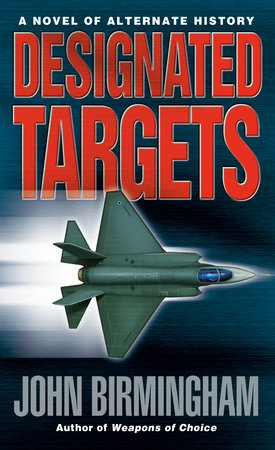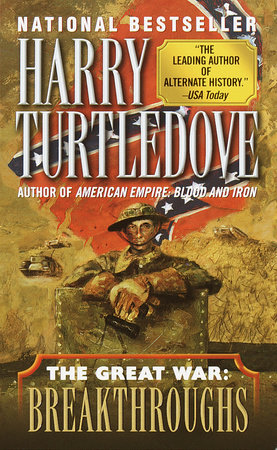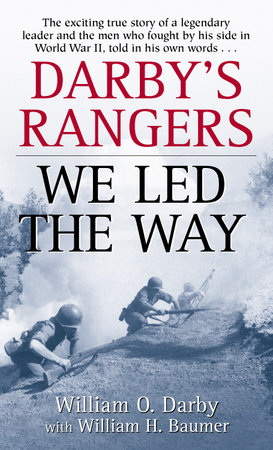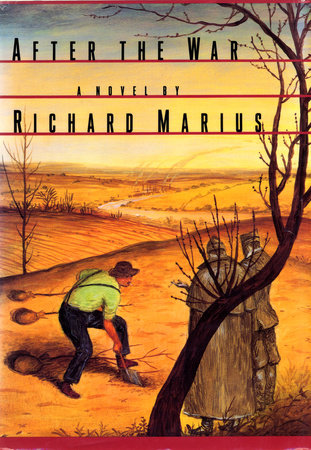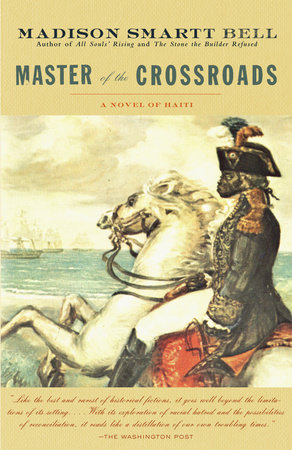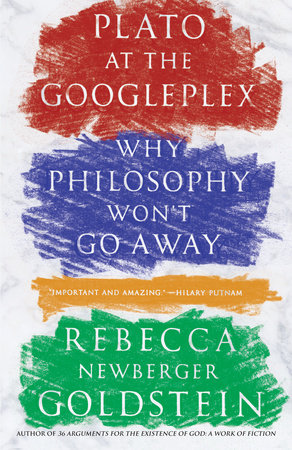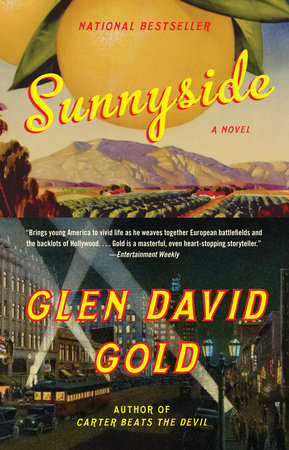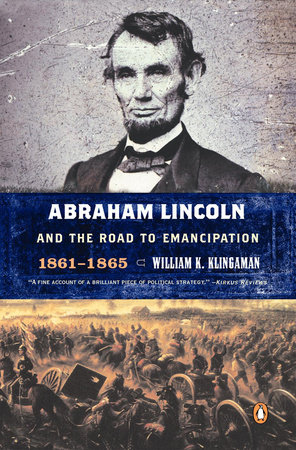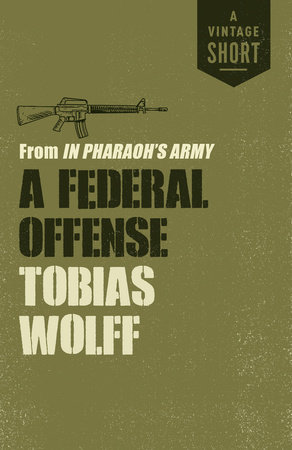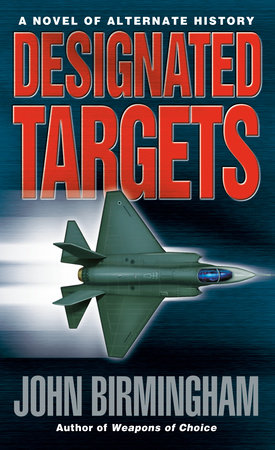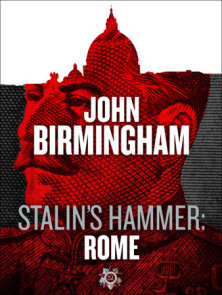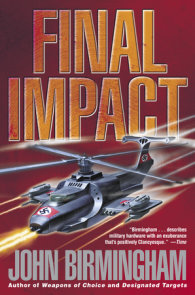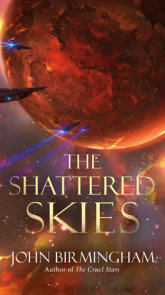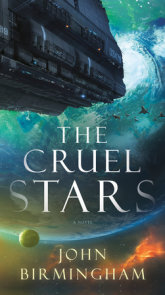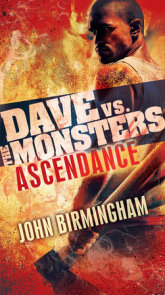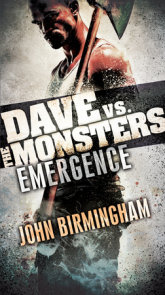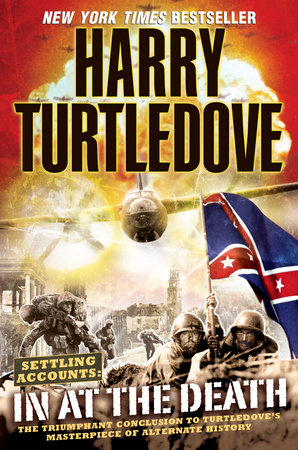Author Q&A
Interview with John Birmingham, author of Designated Targets
Question: Designated Targets is the second in your Axis of Time trilogy, following Weapons of Choice. Will readers unfamiliar with the first novel need to pick it up before reading this one? For the benefit of those readers, can you briefly set the stage?
John Birmingham: I’m afraid there are no short cuts. If you like the look of Targets, you’ll have to read Weapons first. I got a message at my blog (birmo.journalspace.com) the other day from some guy in Australia who’d had that very experience. Bought the second book without reading the first, got about fifty pages in and realized he was lost.
For those who need a road map of Weapons, here’s the shareware lite version. In 2021, the War on Terror continues. An American-led Multinational Force built around a carrier battle group and a Marine Expeditionary Unit are about to intervene in Indonesia, where Islamist rebels have toppled the government and declared a Caliphate in its place. A scientific ship, caught up in the chaos, creates a wormhole and-Whoah! Look out!-everyone boogies on down to 1942. The bulk of the MNF appears on top of the US Fleet heading toward the battle of Midway, and the automated combat systems of the 21C vessels destroy a big chunk of contemporary US Naval power before anyone knows what’s happened.
The Transition, as the event becomes known in the Free World, was an accident, totally uncontrolled, and is subject to local variations in effect. The vessels arrive out of station. Some have been thrown thousands of meters away from where they stood in relation to the rest of the Task Force. Others arrive a little earlier or a little later. Some appear on the far side of the globe. (For lovers of arcane back story, there was a section, cut from the original manuscript, which described in great detail how one of the ships, the British stealth destroyer HMS Trident, was copied seven times and dispatched to seven different realities, with a description of each. But it got chopped.)
Long story short. World War Two goes all pear-shaped. Even more destabilizing than the sudden injection of advanced technology is the sudden 20/20 hindsight provided to all players alike. It seems at first that although the Allies got the bulk of the tech, the Axis powers, with their rigidly controlled political systems, adapt more decisively and quickly. Meanwhile, the good guys get to turn themselves inside out arguing over eighty years of social revolution arriving in one big hit.
Q: The near-future world of 2021 that you envision is frighteningly plausible. How did you extrapolate the scientific, political, and cultural trends that result in that world, and do you think that events since the publication of Weapons of Choice indicate that we are moving toward that particular future, especially in terms of the War on Terror?
JB: The 2021 in Weapons is a bit of a dystopia, a fact that becomes much more obvious in Designated Targets, as the character of the time travelers is revealed. It wasn’t that hard to extrapolate. I simply took some of the really disturbing features of the current global jihad and asked myself what these would look like with booster rockets. And what effect would fighting such a conflict have on our society over twenty years?
Do I think I could get a job as a futurologist? Jeez, I’d hope not. I’ve got Jerry Springer and Bill O’Reilly serving as Senators in 2021. Also, I’d hope that we would have adapted to the demands of this conflict with more alacrity and sophistication than we’ve shown so far. I’d hope that we wouldn’t make strategic blunders on the scale of Iraq again. But we probably will. At least in the short term. The strength of an open political system, however, as opposed to dictatorships such as the theocratic fascist state which is the wet dream of bin Laden and his crew, is that there are, or should be, no sacred cows for us. If our political or military decisions are found wanting, they will be questioned and eventually they’ll be discredited and discarded. We sometimes look weak and conflicted as we rake at each other over whether or not, for instance, Iraq was a good idea. But that process of questioning and contesting everything, which is anathema to totalitarian regimes, is one of our greatest strengths. It’s also one of the central themes of the Axis of Time series.
Q: Although Weapons began in 2021, most of that novel, and all of Designated Targets, takes place in 1942, with recognizable characters and events from that era, including major figures such as Stalin, Hitler, and Churchill. In a general sense, what are the obligations or responsibilities of a novelist to historical accuracy in a book that is, after all, an alternate history?
JB: Quite simply, you have to get it right, or you are going to get pounded. The blessed Hunter S. Thompson used to say they’ll pound you when you’re right, and they’ll pound you when you’re wrong; it just doesn’t hurt as much when you’re right. The very first email I received after Weapons was published came from some guy who loved the book. Just loved it. Spent eight hundred words telling me about his unnatural love. But, did I know that the scene in the bar of the Moana Hotel could not have taken place when I said it did because that particular bar was closed to civilian traffic a month earlier than the date in my story.
You try and avoid that sort of thing, but it’s almost impossible. I’m quite open to being corrected by readers though, and invite them to send through any howlers to my blog. I normally find it’s a break-even deal. Half of the time they’re right. But half of the time they’re wrong. And I live for those moments, let me tell ya!
Bottom line though, you’re asking for a massive suspension of disbelief in books like these, so you’d best make that as easy as possible on the reader. Accurate historical detail is a crucial part of that.
Q: Okay, let me take a shot. I noticed that you had Lieutenant John F. Kennedy commanding PT 101-shouldn’t that be PT 109?
JB: Nope. In the original timeline Kennedy wasn’t even at sea in this period. I originally wrote up all of this backstory about how he used his family connections to get into active service after the Transition wrecked the Pacific Fleet, but it was kind of clumsy and I figured most people would accept that this was now an alternate history, not the original one. There’s plenty of differences besides the number of the boat. I’ve got him bumped up a grade in rank. His friend Barney Ross is now skippering his own boat instead of serving as an ensign on the 109. All of the crew who are named in Targets are different from the original crew. The fit-out of the boat is entirely different. And of course, Kennedy didn’t fight off the coast of Queensland. Still, I was a complete butthead for choosing the number 101. My editor told me not to. What the hell was I thinking? I should have just made it PT 24 or something. Now I’m gonna get pounded, just like Dr. Thompson said.
Q: It seems to me that Stalin, Hitler, Himmler, and a few others are special cases here, because of the atrocities for which they are indisputably to blame. One of the effects of good writing is to enable readers to empathize with characters outside their normal run of experience. How do you accomplish this without making these particular characters seem more sympathetic, or even less guilty, than is warranted by the facts?
JB: With the Nazis I made them figures of ridicule. For me, it was the only way. So you get Hitler sitting through lunch with a big blob of cream on his nasty little mustache because everyone is too scared to point out his faux pas. With Himmler, who is the main Point of View character in the Reich, I embraced his ethical cluelessness. There’s a scene in the last book of the series where he’s trying to be a sympathetic boss for one of his secretaries whose SS husband has been killed on the western front. But his way of doing this is to reassure her that she is of good Aryan breeding stock and will quickly be able to replace him with a new husband from the SS mating program. When she wells up with tears, he is touched by her gratitude.
Interestingly, the communists were slightly different. I read Simon Sebag Montefiore’s awesome book, Stalin: In the Court of the Red Tsar, as part of my research. Having done so, and because I was using the NKVD chief Lavrenty Beria as the main POV character, I could not find a joke worth telling about them. They were such irredeemably criminal scumbags that I preferred to just let history do the talking for them. Although, I guess I have just written a funny scene playing on Beria’s collection of porn and ladies’ underwear. So maybe I’m lightening up on them!
Q: Let’s talk a bit about the Transition. This is not the standard time-travel scenario, in which time is viewed as a closed loop, with the so-called grandfather paradox and other logical problems that science fiction authors from Heinlein on have explored. This is more of a many-worlds situation, isn’t it? That is, Admiral Kolhammer’s Task Force has initiated a new timeline, in an alternate universe in which events are not bound by the history of the "old" timeline.
JB: Yeah. I love the multiverse hypothesis. Not only does it do away with old granddad and his annoying paradox, but you get to dream up an infinite series of possible other-worlds. That was partly behind the excised section in Weapons where I sent seven different Tridents off to seven different universes. One of them had a Europe where only England had held out against Muslim conquerers. Halabi arrives in a nineteenth century level society with "her" country about to be invaded by a Caliphate Armada. God, that was cool. But we cut it.
When I wrote the first version of Weapons, which was called World War 2.1, the Multinational Force arrived in 1946, in an alternate world where the Axis had triumphed. I wrote about forty or fifty thousand words of that scenario but eventually changed it to the real 1942. My point of divergence was Roosevelt dying of polio in his childhood.
It’s also possible of course that Kolhammer and his people have arrived in something that looks exactly like 1942, but it isn’t. Or maybe not.
Q: What has happened to the future from which the task force came? Is it in any way connected to the "new" past; i.e., is return possible, or more travel back to the same timeline? Will you be addressing these kinds of questions in the final volume of the trilogy?
JB: There is no connection. Kolhammer’s people are forever lost because of the infinite number of possible worlds in a multiverse. There is no straight line back home, even if they could rig up some improbable time machine. Some of the characters like Einstein and Halabi occasionally discuss this.
Again, in the first draft of the series, there was a long section devoted to a number of temps, i.e., 1940s personnel, who got sucked into the 21st Century. I originally chopped the Yorktown in half with the event horizon and had a few dozen men in the bow pop out into 2021. We then followed them for a couple of pages as they hit the talk-show circuit. Too weird. Just too fucking weird, and it felt kind of skanky and disrespectful doing that to the Yorktown too, so I chopped a fictional future ship in half instead.
Q: It’s one thing to feature an historical figure like Churchill as a character in a novel; there is a lot of biographical material on which to base a fictional portrayal, and, after all, the man is dead. But that is not the case with Major Harry Windsor, who plays an important part in this series. Were there any legal ramifications in making a still-living member of the royal family a character? Has this been at all controversial?
JB: Man, I hope there’s no legal ramifications! Harry’s mum is loaded and could afford a whole battalion of super-lawyers! I’m not expecting problems though. After all, he’s one of the most engaging characters in Designated Targets. He’s like some 1920s matinee hero, Indiana Jones or something. He gets the best jokes, wins all the toughest fights, and I’m thinking about giving him a really bodacious girlfriend in book three. He remains one of my favorites.
Q: As Mel Brooks might say, It’s good to be the prince!
JB: Yeah, he’s livin’ large without the paparazzi on his case.
Q: One of the many elements that sets your series apart from run-of-the-mill alternate histories, which you alluded to earlier, is the prominence you give to racial, sexual, and gender issues that arise from the clash between the 1942 and 2021 cultures through characters like Colonel J.L. Jones, Captain Karen Halabi, and the reporter Julia Duffy. Can you talk a little bit about this aspect of the books?
JB: Well for me, this was the engine of the story when I was first thinking about this series. Remember the first draft had the Multinational Force arriving in an alternate 1946, where the bad guys had won. Of course, Kolhammer’s people could kick their butts in an afternoon, but the question would arise, how would the temps feel about being rescued by African-American Marine Corps colonels and lesbian fighter pilots. This was especially so in the first draft, because I had the US run by a proto-fascist government a little like Philip Roth’s Lindbergh Administration.
I love conventional techno-thrillers. I was an early and obssessed fan of Clancy and have collected a small library of other writers like Eric L. Harry, who is just fantastic. These issues rarely turn up in their work, however, partly because within the context of the genre they’re considered irrelevent. Fair enough. But I wanted to address them, and I wanted to write a techno-thriller. While I was pondering this dilemma, I came across Steve Stirling’s Nantucket series, and it was like a bomb going off in my head. All of a sudden I want to do it all. High-tech war stories, identity politics, alternate history, and, just as importantly, satire.
Very few of my US readers would know me as a humor writer, but that’s how I started in the UK and Australia. So when I sat down to do Weapons and then Targets, I wanted to indulge myself in at least a few jokes. Again, it’s an element which is rarely found in these genres. Hence the USS Hillary Clinton named after "the most uncompromising wartime president in US history."
For-the-luvva-god, it’s a joke!
Man, I took a pounding for that one, and it was largely because of the novels’ political content. Hillary, it turns out, is kind of a divisive figure. Who’d a thunk it? And some people don’t want to think about racism or sexism when they’re reading military thrillers. Or any time, really, I guess. Unsurprisingly they didn’t appreciate the Clinton joke. Somewhat surprisingly they thought I was either making up or exaggerating the extent of the difference in attitudes to these issues between now and then.
On the other hand, most of the feedback I received from former service personnel has been very supportive. So I sleep well at night.
Q: As if Admiral Kolhammer and his crew don’t have their hands full with the Germans, the Soviets, and the Japanese, they’ve also got J. Edgar Hoover to worry about. How closely did you adhere to the facts in your portrayal of Hoover? What I found truly frightening about him was that he seemed a strangely contemporary figure in his sexual hypocrisy and political paranoia.
JB: A couple of years ago I read the Curt Gentry bio of Hoover. A magnificent piece of work. Then I read the Anthony Summers bio. A magnificent piece of gossip. Between them I’d hope they nailed him, so to speak. I kept both open at either end of the keyboard whenever I was writing a section with Hoover, and almost all of the personal and period detail comes from those two books. My homage to the authors was to make them the congressmen Hoover monsters at dinner about halfway through the book. I have an infantile love of in-jokes like that.
If he were alive today, he’d probably put Tom DeLay to shame.
Q: The world of 1942 seems in many ways a primitive place to the men and women from 2021-yet to the people of 1942, their future descendants seem at times to be barbaric and heartless, epitomizing some of the characteristics of the enemies against which they are fighting. It is the War on Terror that has molded these men and women, who I suppose can be thought of as us and our children. The wisdom of Pogo seems applicable here: "We have met the enemy, and he is us."
JB: There’s a book by the historian Paul Fussell called, I think, Wartime. It looks partly at the cultural effects of the Second World War. For me, a stand-out memory was Fussell’s discussion of what he called the shift from "light" to "heavy" duty, when the population finally realized the situation was serious. It lead to a hardening of attitudes and a sort of coarsening of the soul. All wars do. That’s what’s happening to us right now. In many ways it’s a process beyond ethical consideration. It’s like natural selection for the spirit.
Q: Do you still plan to end the series with the next volume? I ask because the material is rich enough for more than just one more book, and I’m sure I’m not the only reader who would be sorry to see the action come to an end so soon.
JB: Oh look, it would piss off so many people if I didn’t provide "closure" at the end of book 3 that I’d be in danger of getting lynched. So I am going to wrap up the story. But unlike Fukayama, I don’t believe history comes to an end, and although the war will finish, the world it has created won’t. So there will be plenty of scope for more Transition novels. I wrote more about the military than the social effects in these books. I’d like to go back and redress that at some point. Maybe set a couple of detective novels in the Zone or something. How would Philip Marlowe react to LA today? Alternately I wouldn’t be averse to licensing the universe and letting others write their own stories set there. Eric Flint has done that with his 1630s universe, and it rocks.
Q: The Axis of Time is being published as science fiction. Do you think that limits the potential audience of the books? Do you consider yourself to be a science fiction writer?
JB: The marketing mavens tell me it does. But what the hell? I’m a believer, and I’m happy to write for other believers. Having said that, I still haven’t written a "pure" techno-thriller as I wanted. I might yet go there, perhaps using some characters from this series. A young Phil Kolhammer kicking jihadi butt? It works for me.
Q: These books would make a terrific movie-are there any possibilities of this?
JB: If you’ve got a spare hundred million, they’re yours. I suspect they’d make a better TV series though. More time to explore the characters and consequence.
Q: Are you working on any other projects now?
JB: Oh yeah. I work as a sports writer in my "spare time." That always keeps me busy. I also have some nonfiction work due in Australia: some actual history, as opposed to the alternate stuff.
I’m finishing book three, or should be, as I write this. When that’s wrapped, I’ll sit down and have a think about what to do next. My guess? A couple of prequel thrillers and a new alternate history series. But if I told you my plans for the Transition world, I’d be giving away some serious spoilers.
